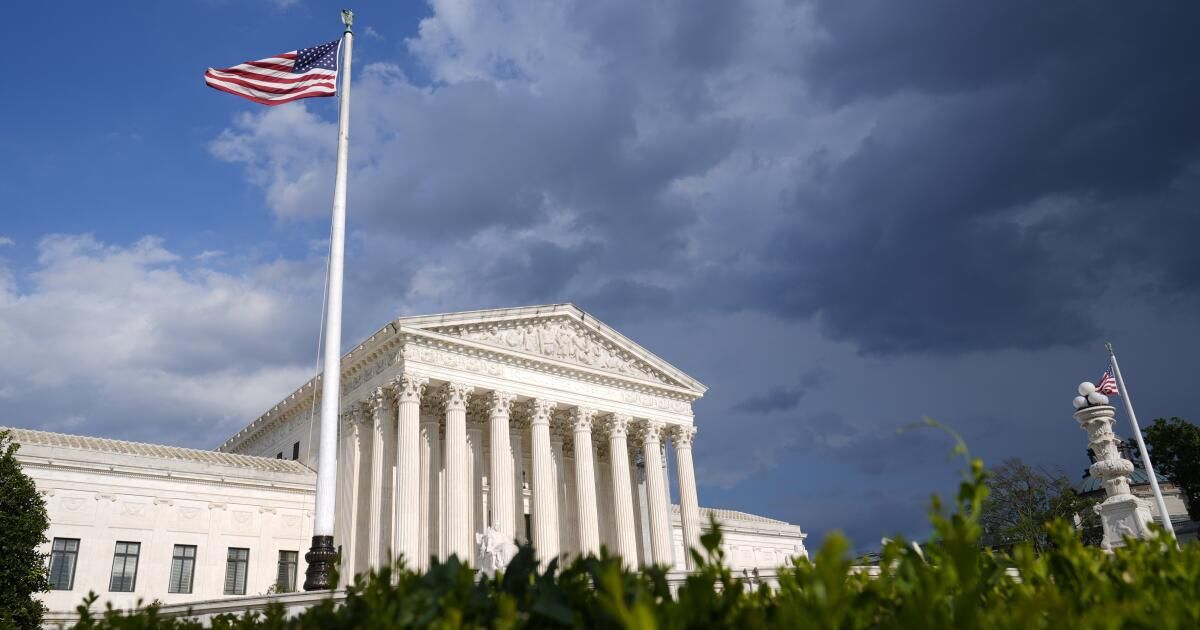Term limits for Supreme Court justices are a popular idea, but they would require amending the Constitution and would be unlikely to affect current justices, legal experts say.
On Monday, President Biden endorsed term limits as one of “three bold reforms to restore trust and accountability” in the court.
Biden also called for a constitutional amendment to say former presidents are not immune from criminal charges for their actions in the White House, which would reverse the Supreme Court's decision from earlier in July.
And it approved a “binding code of conduct” that applies to Supreme Court justices.
Biden was less clear about how term limits could be enacted into law and whether they would apply only to new justices or instead force older judges to retire.
“I support a system in which the president would appoint a justice every two years to serve 18 years on active duty on the Supreme Court,” Biden said in an op-ed in the Washington Post on Monday.
Legal experts say such a change could only be implemented through a constitutional amendment.
“I strongly support an 18-year term limit for Supreme Court justices, but I believe this would require a constitutional amendment, especially if it were applied to current justices,” said Erwin Chemerinsky, dean of the UC Berkeley School of Law.
Polls show that a majority of Americans support the idea of limiting the terms of Supreme Court justices. This idea is particularly popular among many Democrats and progressives, who seek to limit the power of the current 6-3 conservative majority on the Court.
But to change the Constitution, the support of two-thirds of the House and Senate and three-quarters of the states is needed.
An Associated Press poll last summer found that 67 percent of Americans supported Supreme Court justices serving fixed terms instead of the current lifetime terms. That included 82 percent of Democrats and 57 percent of Republicans.
The Constitution says that judges and magistrates, once appointed, “remain in office as long as they maintain good conduct,” which was then and since then understood to mean that they had life terms.
House and Senate Democrats have proposed bills that would establish an 18-year term for Supreme Court justices and push older justices into semi-retired “veteran status” after 18 years on the court. If enacted now, it would sideline three conservatives: Justices Clarence Thomas and Samuel A. Alito Jr. and Chief Justice John G. Roberts.
But the bills have no chance of advancing in this Congress, and would face a tough constitutional challenge if passed in the next Congress.
Georgetown Law professor Steve Vladeck wrote that Biden’s “delay in pushing for unattainable (and ineffective) reforms only highlights the opportunities he has missed to change the national conversation about the Supreme Court… These reforms have no chance of being adopted, and even if they are adopted, they are unlikely to be effective in the near future.”
When Biden took office in 2021, he was under pressure to do something about the conservative court that had three new members appointed by Trump. He appointed a presidential commission to study the matter and issue a report, but nothing further was done.
“For most of American history, members of Congress have assumed that the only constitutional way to achieve term limits for Supreme Court justices is through a constitutional amendment,” the report states. “From 1807 to the present, more than two hundred proposals have been introduced in Congress to amend the Constitution to establish term limits for Supreme Court justices or for federal judges generally.”
None were passed. The first bill proposing to set term limits by law was introduced in 2020, the report noted.
Chemerinsky said that establishing term limits by law “would be particularly problematic if applied to current judges because they were appointed and confirmed with the clear understanding that they were lifetime appointments.
However, if term limits are not applied to current judges, they will not make any difference for a long time.”
He noted that six of the current justices are under age 70 and that conservative Justices Brett M. Kavanaugh, Neil M. Gorsuch and Amy Coney Barrett are likely to serve 20 years or more.












